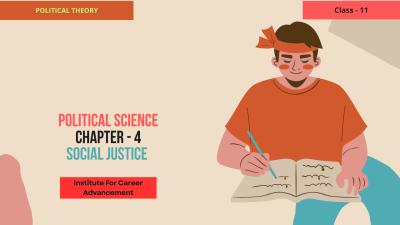Social Justice - Class 11

₹299
Social Justice is a concept that seeks to ensure that all individuals have equal opportunities and rights, regardless of their social or economic status. It is about creating a society where everyone has a fair chance to succeed and where no one is disadvantaged based on factors like race, gender, class, or disability. Key aspects of Social Justice: Equality: Ensuring that everyone has equal opportunities and rights, regardless of their background. Equity: Recognizing that people have different starting points and may require different levels of support to achieve equality. Inclusion: Creating a society where everyone feels valued, respected, and belongs. Human rights: Upholding and protecting the fundamental rights of all individuals. Social justice movements: Organized efforts to promote social justice and address inequality. Challenges to Social Justice: Discrimination: Prejudice and discrimination based on factors like race, gender, class, or disability can hinder social justice. Inequality: Existing inequalities in wealth, education, and opportunities can perpetuate social injustice. Social biases: Stereotypes and prejudices can contribute to social injustice. Political marginalization: Certain groups may be excluded from political processes, limiting their ability to influence policy decisions. Economic disparities: Economic disparities can create unequal opportunities and access to resources. Promoting Social Justice: Legal reforms: Laws and policies that promote equality and prohibit discrimination. Social reforms: Programs and initiatives that address social biases and promote inclusion. Economic policies: Policies that promote economic growth and reduce inequality. Political reforms: Measures that ensure that all individuals have equal access to political participation. Education and awareness: Raising awareness about the importance of social justice and promoting education on diversity and inclusion. Social justice movements: Supporting and participating in social justice movements that advocate for equality and equity. Social Justice is a complex and ongoing process that requires a multifaceted approach to address the challenges of inequality and discrimination. By promoting social justice, societies can create a more just, equitable, and inclusive world. সামাজিক ন্যায়বিচার এমন একটি ধারণা যা সামাজিক বা অর্থনৈতিক অবস্থান নির্বিশেষে সকল ব্যক্তির সমান সুযোগ এবং অধিকার নিশ্চিত করতে চায়। এটি এমন একটি সমাজ গঠনের বিষয়ে যেখানে প্রত্যেকেরই সফল হওয়ার ন্যায্য সুযোগ রয়েছে এবং যেখানে জাতি, লিঙ্গ, শ্রেণি বা অক্ষমতার মতো বিষয়গুলির ভিত্তিতে কেউ বঞ্চিত নয়। সামাজিক ন্যায়বিচারের মূল দিকগুলিঃ সমতা (Equality): প্রত্যেকের সমান সুযোগ এবং অধিকার নিশ্চিত করা, তাদের পটভূমি নির্বিশেষে। সমতা স্বীকার করা যে মানুষের বিভিন্ন প্রারম্ভিক পয়েন্ট রয়েছে এবং সমতা অর্জনের জন্য বিভিন্ন স্তরের সমর্থনের প্রয়োজন হতে পারে। অন্তর্ভুক্তিঃ এমন একটি সমাজ তৈরি করা যেখানে প্রত্যেকে মূল্যবান, সম্মানিত এবং সম্পর্কিত বলে মনে করে। মানবাধিকারঃ সকল ব্যক্তির মৌলিক অধিকার রক্ষা ও সমর্থন করা। সামাজিক ন্যায়বিচার আন্দোলনঃ সামাজিক ন্যায়বিচারের প্রচার এবং বৈষম্য দূর করার জন্য সংগঠিত প্রচেষ্টা। সামাজিক ন্যায়বিচারের চ্যালেঞ্জঃ বৈষম্যঃ জাতি, লিঙ্গ, শ্রেণী বা অক্ষমতার মতো বিষয়গুলির উপর ভিত্তি করে কুসংস্কার এবং বৈষম্য সামাজিক ন্যায়বিচারকে বাধা দিতে পারে। অসমতাঃ সম্পদ, শিক্ষা এবং সুযোগ-সুবিধার ক্ষেত্রে বিদ্যমান অসমতা সামাজিক অবিচারকে স্থায়ী করতে পারে। সামাজিক পক্ষপাতঃ স্টেরিওটাইপ এবং কুসংস্কার সামাজিক অবিচারের ক্ষেত্রে অবদান রাখতে পারে। রাজনৈতিক প্রান্তিকীকরণঃ কিছু গোষ্ঠীকে রাজনৈতিক প্রক্রিয়া থেকে বাদ দেওয়া হতে পারে, যা তাদের নীতিগত সিদ্ধান্তগুলিকে প্রভাবিত করার ক্ষমতাকে সীমাবদ্ধ করে। অর্থনৈতিক বৈষম্যঃ অর্থনৈতিক বৈষম্য অসম সুযোগ এবং সম্পদের প্রাপ্যতা তৈরি করতে পারে। সামাজিক ন্যায়বিচারের প্রচারঃ আইনি সংস্কারঃ আইন ও নীতি যা সমতার প্রচার করে এবং বৈষম্য নিষিদ্ধ করে। সামাজিক সংস্কারঃ এমন কর্মসূচি ও উদ্যোগ যা সামাজিক পক্ষপাতিত্বের মোকাবিলা করে এবং অন্তর্ভুক্তিকে উৎসাহিত করে। অর্থনৈতিক নীতিঃ এমন নীতি যা অর্থনৈতিক প্রবৃদ্ধিকে উৎসাহিত করে এবং বৈষম্য হ্রাস করে। রাজনৈতিক সংস্কারঃ এমন পদক্ষেপ যা নিশ্চিত করে যে সমস্ত ব্যক্তির রাজনৈতিক অংশগ্রহণের সমান সুযোগ রয়েছে। শিক্ষা ও সচেতনতাঃ সামাজিক ন্যায়বিচারের গুরুত্ব সম্পর্কে সচেতনতা বৃদ্ধি এবং বৈচিত্র্য ও অন্তর্ভুক্তির বিষয়ে শিক্ষার প্রচার করা। সামাজিক ন্যায়বিচার আন্দোলনঃ সমতা ও সাম্যের পক্ষে সামাজিক ন্যায়বিচার আন্দোলনকে সমর্থন ও অংশগ্রহণ করা। সামাজিক ন্যায়বিচার একটি জটিল এবং চলমান প্রক্রিয়া যার জন্য বৈষম্য এবং বৈষম্যের চ্যালেঞ্জ মোকাবেলায় বহুমুখী পদ্ধতির প্রয়োজন। সামাজিক ন্যায়বিচারের প্রচারের মাধ্যমে সমাজ আরও ন্যায়সঙ্গত, ন্যায়সঙ্গত এবং অন্তর্ভুক্তিমূলক বিশ্ব তৈরি করতে পারে।
Learn more
 0
0 